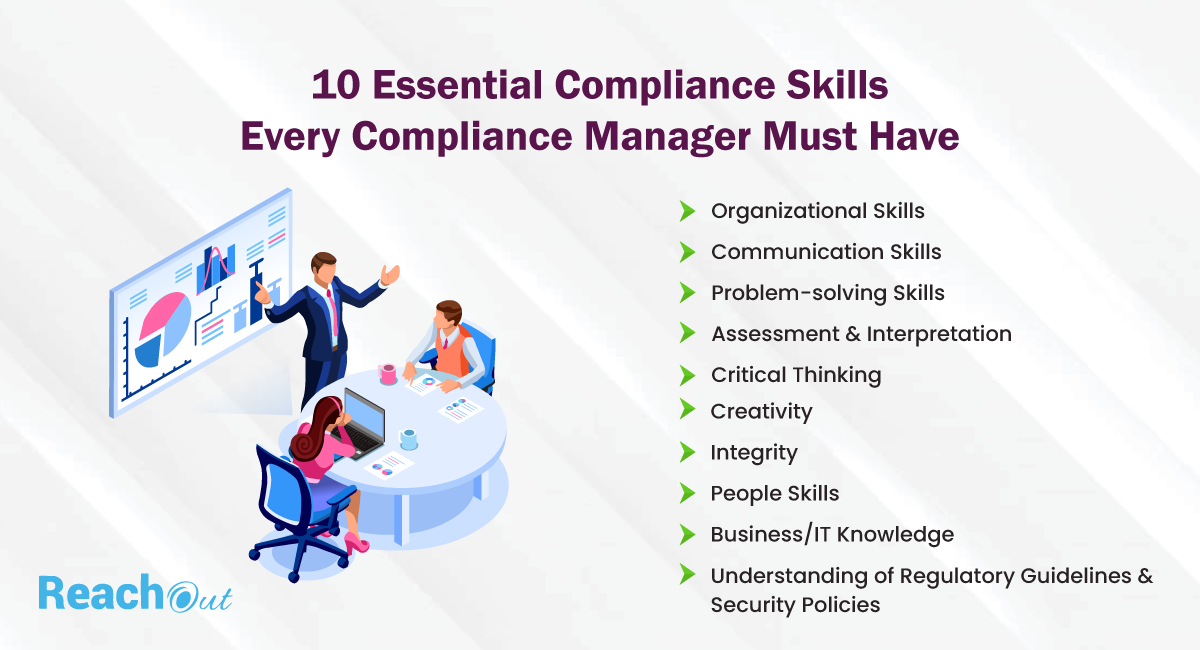
10 Essential Skills Every Compliance Manager Must Have!
The compliance manager is like the company’s rulekeeper. Their main job is to ensure that the company acts ethically and follows all the laws and regulations. This helps maintain the company’s good reputation and avoids any legal trouble.
Now, here’s why it’s so crucial. A study by the Ponemon Institute states that the global cost of compliance failures reached a staggering $6 trillion in 2020 alone. Data privacy breaches alone continue to sting, with an average cost of $4.35 million in 2023, according to an IBM report.
In this article, we list the essential skills that compliance managers or officers should have to remain successful.
- Excellent Organizational Skills
- Proficient Communication Skills
- Effective Problem-solving
- Assessment & Interpretation
- Critical Thinking Ability
- Creativity
- Integrity
- Strong People Skills
- Up-to-date Knowledge of Business Technology and IT
- Sound Understanding of Regulatory Guidelines and Security Policies
Who is a compliance manager?
Compliance managers assess risks, conduct check-ups, and identify any problems with following the rules. They also make sure written and spoken company policies are clear and followed. This helps prevent issues and keeps the company’s reputation clean.
Here are some key tasks they handle:
- Assessing business risks.
- Checking if standards are being followed through audits.
- Spotting any compliance issues.
- Making sure all organizational policies and regulations are followed.
- Developing strategies to manage risks.
- Investigating compliance procedures and taking the necessary actions.
To ensure strict compliance, compliance managers rely on systems and procedures, with service management software being a common tool.
This software assists in planning training, tracking documents, and staying current on regulations, ultimately streamlining their work and allowing them to focus on larger tasks, thus maintaining smooth company operations.
Related reading: A Complete Guide to Field Service Management
Coveted Skills for Compliance Managers
To effectively carry out their tasks and achieve desired results, compliance managers need specific skills and expertise.
They need a well-rounded skillset that combines technical knowledge with strong communication and problem-solving abilities.
Here are the top skills for compliance managers:
-
Organization Skills
Compliance managers need to juggle multiple tasks within set deadlines. They should ensure all employees are aware of the rules and regulations for maintaining compliance within the organization. Before starting the compliance process, clear goals should be established and achieved within a specific schedule.
Compliance managers must have a clear plan of action, knowing what needs to be done, how, and when. Breaking down inspections or audits into smaller tasks and assigning them can also be beneficial.
-
Communication Skills
Just like many other jobs, compliance managers need good written and verbal communication skills. They also require interpersonal skills such as listening and decision-making to conduct compliance processes effectively. Compliance officers need to reflect on and clarify regulatory topics.
Quality communication skills are crucial for keeping all sectors and resources aligned with compliance requirements. Effective communication is essential for sharing audit findings in a report.
-
Problem-Solving Skills
Problem-solving for compliance officers involves using both creative and analytical thinking. They often deal with challenges like unclear regulations, cost issues, and potential business failures. Field officers must identify risks associated with policy-making to find simple solutions.
Implementing and monitoring solutions is crucial for effective problem-solving. It’s important to follow planned steps and provide feedback on chosen solutions. Auditors should also have a good understanding of business and make sound judgments on what to do next.
-
Assessing and Interpreting Risks
The risk management process has several key steps: identification, analysis, planning, monitoring, reporting, and control. Compliance managers need to understand and follow these steps.
According to Deloitte’s Compliance Risk Assessment report, a comprehensive compliance risk evaluation includes a framework and methodology for assessing and prioritizing risks. This is part of a compliance management system that integrates all processes, from documentation to tools, to ensure organizations follow standardized procedures and guidelines.
Learning from past regulatory mistakes helps prevent future non-compliance. To assess compliance risks effectively, compliance managers need a solid understanding of regulatory concepts and their relevance to the business. Risk management involves statistical analysis, so managers must be able to evaluate risks and understand their legal, financial, business, and reputational implications for the organization.
Related Reading: How to Put Together an Effective Audit Program
-
Critical Thinking
Critical thinking is a valuable skill for compliance managers. They need to think rationally and clearly when analyzing risks. For auditors, critical and analytical thinking is crucial for analyzing data and providing strategic input.
According to a report by KPMG, critical thinking is among the top skills needed for internal auditing. The report highlights foundational essentials for a critical thinking approach to audits, including:
- Open-mindedness
- Situation analysis
- Providing context
- Brainstorming
- Concluding
Compliance managers should offer practical solutions to address problems. They need to think reflectively and independently, understanding the logical connection between business policies and compliance regulations.
Related Reading: Find 6 Tips To Prevent Common Maintenance Manager Mistakes.
-
Creativity
Creative skills are essential for compliance managers. They need to grasp compliance risks and regulatory measures within the business. Creativity helps them identify connections between seemingly unrelated risk analysis and decision-making.
Being creative allows compliance managers to generate solutions for unique compliance issues. They need creativity and innovation to blend current business processes with effective compliance and audit inspections and reports.
-
Integrity
Integrity is a must for any profession. Compliance managers are no exception. The regulation management process can only be implemented and accomplished effectively if the officers carrying out the inspection reports have strong moral principles and honest quality.
They should uphold being in an undivided and unbiased state while executing their tasks. Compliance managers should be trustworthy. They should also have confidence and resilience when faced with tough situations and dealing with audit reports.
-
People Skills/Relationship Building
Understanding people and staying calm are vital skills for auditors. This helps compliance officers gain trust and credibility with clients. Compliance managers need to be approachable and avoid being confrontational or aggressive.
By grasping company situations, responding to mistakes appropriately, and empathizing well, compliance officers can fulfill compliance policies effectively. Building relationships with clients and companies fosters trust, respect, and productive interactions.
Related Reading: Learn how your Field Staff is your secret weapon to improve sales and revenue.
-
IT Knowledge
Understanding the latest business technologies and IT requirements is crucial for compliance managers. It not only ensures smooth audit sessions but also helps them advance in their careers. Continuous learning and teamwork are facilitated by this knowledge.
According to Accenture’s Compliance Risk Study, there is a growing demand for compliance officers who are digitally savvy, analytical, and proactive in addressing the challenges of the digital age.
Having sharp business acumen is essential for compliance officers. This includes being adaptable to different audit environments and being flexible about regulatory errors. IT knowledge is also important for auditors, combining accounting with technical expertise.
Mastery of primary IT tools, especially service management software, is vital. Additional training through platforms can greatly enhance compliance managers’ understanding of business technologies, IT tools, and the latest regulatory policies.
-
Knowledge About Vulnerability/Security
Understanding security policies is crucial for compliance managers to ensure successful audit processes. They need to identify potential vulnerabilities and discuss prevention measures or repair steps based on the audit report’s status. Compliance managers should be familiar with various security standards, such as ISO standards, interception regulations, and control policies.
Their role includes overseeing compliance programs and efficiently generating audit reports. To achieve a perfect compliance process, compliance officers must adhere to the skills mentioned above. They should follow general principles for each skill set and ensure compliance with all relevant rules, laws, and regulations while respecting the diverse roles and responsibilities within a firm.
To improve compliance managers’ capabilities, utilizing specialized field service software like ReachOut Suite can be beneficial. This software offers a variety of features, such as checklists and paperless forms, to facilitate easy management. Contact us now to learn more!
Aarathy
With over a decade of experience in the technology sector, Aarathy is passionate about improving field service efficiency through digital innovation. She is particularly interested in topics such as field service trends, service automation, and strategies for implementing digital transformation in service management.
More posts by Aarathy


